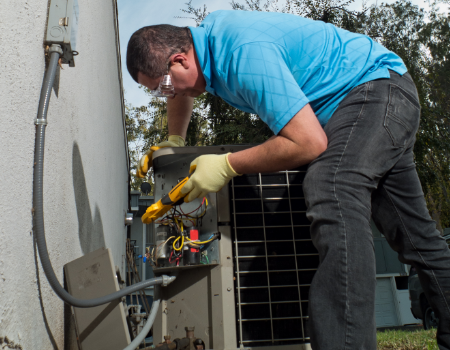
The lifespan of an HVAC system varies depending on how often it is used and how well it is maintained. However, they eventually have a lifespan, and even with maintenance and repairs, at some point, even the best ones will come to the end of their life. In general, most systems last between 15 and 25 years. However, there are several factors that can affect how long an HVAC system lasts. In this blog post, we will discuss the factors that influence how long an HVAC system lasts and when you should consider upgrading your system.
Schedule Your Heat Pump Tune-UpSchedule an Appointment
Typical HVAC Life Spans
The lifespan of an HVAC system is determined by how often it runs. Systems that are used more frequently will have a shorter lifespan than those that are used less often. In general, most HVAC systems last between 15 and 25 years. However, several factors can affect how long an HVAC system lasts. The service life of an HVAC system depends on its type. Here are the typical life spans for common HVAC equipment:
Furnaces
The average furnace lasts 20-30 years. If you want your furnace to last longer, ensure it's maintained with scheduled repairs and replacements. Systems that are not maintained regularly or the ones with questionable quality may last ten years. A furnace can be replaced when the heat exchanger starts leaking.
Boilers
The average boiler lasts 20-35 years with proper maintenance. As with furnaces, if your boiler is regularly maintained, it will sometimes last longer – up to 40 years. It would be best if you replaced your boiler when the heat exchanger starts leaking or when the unit becomes inefficient.
Air Conditioners
The average central air conditioner lasts 15-20 years, though some may last closer to 10. The compressor is the most expensive component of an AC unit, so many homeowners opt to replace the entire system when the compressor fails. If you maintain your AC unit properly, it will last longer and be more energy-efficient.
Heat pumps
The average heat pump lasts 10-20 years, depending on usage frequency, and 15 is average. As with other HVAC equipment, if you maintain your heat pump properly, it will last longer – up to 30 years in some cases. You should replace your heat pump when the compressor or other major components fail.
Ductless mini-splits
Like heat pumps, ductless mini-splits can provide heating and cooling, with a typical life span of 10-30 years. These systems are usually replaced when the compressor or other major components fail.
Even if these are the most common life spans, homeowners may choose to replace their HVAC system sooner. As the system is 10 -15 years old, repair and utility costs will increase, and it will gradually become less reliable and efficient. Therefore, upgrading to a more efficient model can often justify the initial investment, especially if the current system is unreliable or has significant problems.

Factors That Affect HVAC Service Life
There are many things that can reduce the life span of HVAC equipment, including:
- Inadequate maintenance
- Poor installation
- Use in extreme temperatures (either hot or cold)
- Frequent on/off cycles
- Dust and debris in the system
- Humidity levels
Of these, maintenance is quite essential. How well you maintain your HVAC system will affect its lifespan noticeably. Regular maintenance – such as changing the air filter, cleaning the coils, and having annual tune-ups – will prolong the life of your system.

When to Replace HVAC: 7 Signs to Look for
#1: Your Energy Bills Are Going Up
Whether your heating bill in winter or cooling costs in summer, your HVAC system needs to retire if your energy costs go up yearly. Remember, the average HVAC system lifespan is between 10–25 years, based on your climate and the type of heating and cooling system you have. But your system may last shorter if it has been overworked. A professional energy audit is the only way you can know if your HVAC is underperforming and overworked. You may be able to get a free energy audit through Sealed.
#2: Your Interior Air Quality isn't Great
Suppose you or your family members have been experiencing more allergies, headaches, congestion, or respiratory problems since you've turned on your furnace or air conditioner. In that case, it may be time to replace your HVAC system. Your current unit might not have the right MERV rating for your home—or it could be that your ductwork is full of dirt and dust.
#3: You're Spending Quite a Bit on HVAC Repairs
If you constantly have to call in a professional to fix your HVAC system, it may be time for an upgrade. Over time, parts will wear out and break down—and eventually, the repairs will start to cost more than a new system.
#4: You're not Comfortable in Your Own Home
Is it too hot in the summer and too cold in the winter? Even if your outside AC unit constantly runs, your house still feels stuffy. Or maybe, there are uneven temperatures between rooms? These are general symptoms of a whole-house problem involving your HVAC system.
Upgraded insulation with professional air sealing and the best HVAC helps you resolve temperature problems while reducing the house's energy waste. Keep in mind that insulation and air sealing work together to form a crucial thermal boundary between the house's inside and the outside climate. Comfortable and—well—inside.
#5: Your HVAC System Relies on Fossil Fuels
If your HVAC system still relies on fossil fuels—such as oil or gas—to generate heat, it's time to upgrade. Not only are these fuels bad for the environment, but they're also becoming increasingly expensive. If you want to save money and do your part for the environment, consider upgrading to a geothermal heating and cooling system. Using modern HVAC technology makes electricity a cheaper, cleaner, and more efficient energy source.
Geothermal systems use the earth's renewable energy to generate heat in winter and cool air in summer. These systems are not only more environmentally-friendly, but they're also more efficient, which means you'll save money on your energy bills. In fact, according to the U.S. Department of Energy, you can save up to 70% on your heating and cooling costs with a geothermal system.
If you're not ready for a complete HVAC upgrade, you can still save money and help the environment by switching to more efficient fossil fuels, such as natural gas.
#6: Your HVAC System has an Air Conditioner that Uses R-22 Freon Refrigerants
If your air conditioner uses R-22 Freon refrigerants, it's time for an upgrade. The U.S. Environmental Protection Agency (EPA) has banned the production of this type of refrigerant, so it's becoming increasingly difficult (and expensive) to find.
If your air conditioner uses R-22 Freon, you may be tempted to wait until it breaks down before replacing it. However, we recommend upgrading now because the sooner you do, the more money you'll save in the long run. Newer systems use more environmentally-friendly refrigerants that are less expensive and easier to find.
When shopping for a new air conditioner, look for one that uses R-410A refrigerants. This type of refrigerant is more environmentally friendly and efficient, which means you'll save money on your energy bills. To know if your air conditioner uses R-22, check the detailed information on the condenser unit, your appliance manual, or call an HVAC professional.
#7: Your HVAC System is Aging
Even if you take good care of your HVAC system, it will eventually reach the end of its lifespan. If your system is over 15 years old, it's time to start thinking about replacing it. While you may be tempted to keep using your old system as long as possible, remember that an outdated HVAC system is less efficient and could break down when needed. Moreover, your house is likely consuming way more energy than it should because of your ancient HVAC system. You don't have to pay more than you need to heat or cool your home. By upgrading to a new, energy-efficient system now, you can avoid being left in the cold (or heat) later on.

5 Ways Your Local HVAC Contractor Can Help
When you experience issues with your HVAC system or are unsure if it's time to upgrade your HVAC system, your local HVAC contractor can help.
- They can perform a professional energy audit to assess your current system's performance.
- They can recommend upgrades that will help you save money and improve your indoor air quality.
- They can install a new, energy-efficient system that meets your specific needs. These systems are both environmentally-friendly and cost-efficient.
- They can service your existing system to ensure it's running as efficiently as possible.
- As we said, you can increase your HVAC system's lifespan with a well-maintain. Maintenance increases efficiency and minimizes the chance of breakdowns. Your local HVAC contractor can provide maintenance services to prolong the life of your HVAC system.
- Whatever your HVAC emergency may be, you can find an HVAC contractor that offers 24-hour repair services.

